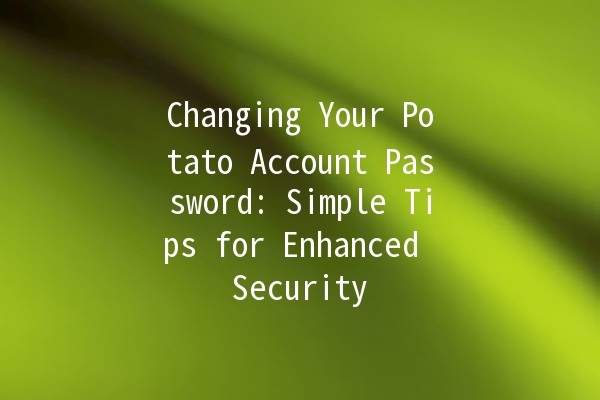In today's digital age, safeguarding your online accounts is paramount, and that includes your Potato account. Whether you use your Potato account for cloud storage, gaming, or social interaction, keeping your password secure is essential. Here, we provide practical tips and actionable strategies to ensure you can efficiently change your Potato account password and enhance your account security.
Understanding the Importance of a Strong Password
Before delving into the specifics of changing your Potato account password, it is imperative to understand why having a robust password is important. A strong password:
The Characteristics of a Strong Password
To strengthen your passwords, remember these characteristics:
Length: Aim for at least 1216 characters.

Complexity: Include uppercase letters, lowercase letters, numbers, and special symbols.
Unpredictability: Avoid common words, usernames, or easily guessable information.
How to Change Your Potato Account Password
Changing your Potato account password is a vital skill, ensuring that you remain in control of your account. Here’s a straightforward method to change your password effectively.
StepbyStep Instructions
Practical Example
Imagine you’ve just purchased your first Potato account subscription for gaming. Following the steps above, you log in and decide to change your password from "gamer123" to "Super$ecret2023!" This new password is robust and less likely to be compromised, enhancing your account's security.
Productivity Tips for Password Management
Managing passwords can be daunting, but the following techniques can drastically improve your productivity:
Description: Password managers store and encrypt your passwords in a secure vault, making it easier to manage multiple accounts.
Application: Consider using tools like LastPass or 1Password to store your Potato account password along with others. They can generate random, strong passwords for you.
Description: TwoFactor Authentication provides an additional layer of security, requiring not only a password but also a second verification method.
Application: After changing your Potato account password, enable 2FA. This can involve receiving a code on your phone or using an authenticator app like Google Authenticator.
Description: Regularly updating your passwords can minimize the risk of breaches.
Application: Set a reminder to change your Potato password every 36 months. Utilize a calendar app to automate this process.
Description: Using the same password across multiple accounts increases vulnerability.
Application: Use unique passwords for your Potato account and other services. A password manager can help you track these unique passwords.
Description: Unsafe browsing can expose your credentials to phishing attacks or malware.
Application: When logging into your Potato account, ensure you are on the official website or application. Avoid public WiFi for sensitive transactions.
Common Questions About Potato Account Password Changes
If you forget your Potato account password, navigate to the login page and click on “Forgot Password?” Follow the prompts to reset your password via email or SMS verification.
It's advisable to change your password every 3 to 6 months. However, if you believe your account has been compromised, change it immediately.
No, it is not recommended to use the same password across multiple platforms. Each account should have a unique password to enhance security.
While browsers offer passwordsaving solutions, they may not be as secure as dedicated password managers. If you choose to save passwords in your browser, ensure your computer is secure and that you use strong passwords.
If you cannot access your registered email, look for recovery options provided on the Potato website, such as answering security questions or using an alternative recovery email or phone number.
Weak passwords can result in unauthorized access to your account, leading to data theft, identity fraud, and loss of sensitive information.
Enhancing Your Security Further
Once you've successfully changed your Potato account password, consider additional security measures:
Regular updates can fix vulnerabilities that could be exploited by hackers.
Check for any suspicious activity regularly. If you notice anything unusual, change your password immediately.
Understanding different phishing tactics can help you avoid traps set by cybercriminals.
When prompted to answer security questions, choose answers that are not easily found on public records or social media.
If you must use public WiFi, consider using a VPN to encrypt your internet connection and protect your data.
Incorporating these practices will help you maintain a safer online presence, protecting your Potato account from potential threats. Remember, security is an ongoing process, and staying informed is crucial.